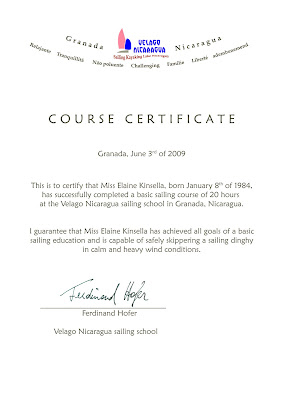It is Monday, the first day of June 2009, a perfect day to begin our beginner's sailing course in Nicaragua. At 7am, we meet Ferdinand at Velago Nicaragua - Irina and I are feeling very excited! Before getting in the boat we must learn some theory. We learn about wind directions, points of sail and sail positions. All seems to make sense, on paper at least. Then, it is time to learn the correct names of all the parts of a boat, many are familiar to me but poor Irina has to learn all these words for the first time in English, her second language! Theory over, we learn how to rig our training boat, Helga (another Gruben jolly boat); attaching the rudder, hoisting the sail, hooking up all the various lines/sheets and lowering/raising the centreboard. The next task is learning how to put the theory and rigging in motion!

Helga

Trying to figure out what attaches to what!
The course is intensive - we are cramming a 20-hour course into three days. We borrow bicycles and cycle to and from the sailing school. Our daily routine consists of breakfast at 6am, cycle fifteen minutes to the sailing centre, three hours of sailing, cycle 15 minutes back to town for lunch, cycle back to sailing school, three more hours of sailing, then finally cycle back to town in time for either yoga or salsa depending on the evening. We sleep soundly every night, dreaming about planing over waves.

Ferdinand & I cycling back to town after a morning's sailing lesson

Views of Mombacho volcano behind
Sailing is physically and mentally challenging - it works every muscle, demands concentration and requires quick-thinking and good coordination. I liked being on Dad's boat as a child, but now that I am at the helm and understanding how to control the boats movements, I absolutely love it! It is one of the most exhilarating sports I have tried - anyone who disagrees should certainly give it a try. I realise that I am a speed-demon, enjoying finding the fastest point of sail and "hiking out" to reduce the heeling effects of the wind. There is no doubt I am hooked, as is Irina. We both discuss how we can incorporate sailing into our already long list of hobbies...

Helga in the foreground, with a pretty catamaran behind
Ready to go about....?

On day two, we spend another 6 hours on the water - learning the art of sailing with the main sail and the Genoa (tricky business!). The winds are much stronger today (although the sun is still shining), and at one point I physically cannot pull in the main sheet - this is a game of tug o' war I cannot win. We tack back to shore and take a crash-course in knots - learning eight of the most useful knots for sailing. The locals watch us sailing across the lake, criss-crossing regularly and surely must think we are mad! There are no other sailboats here, small engine boats are used either to transport people or for fishing. Boating for pleasure is unheard of. With 90% of the local residents of Granada unable to swim, Ferdinand relies mainly on tourists or expats for business.
On our final day, the winds have picked up even further and Ferdinand recommends that we postpone the course until tomorrow. We are now on a fairly tight schedule to get to Guatemala City to take a flight to Tikal (location of Mayan ruins, northern Guatemala) so after some discussion we decide to rig the boat and give it a go today (postponing only if absolutely necessary). Sailing is good for the first hour and we manage to get some practice tacking and jibing. When we consider practicing man-over-board rescue the wind takes over (we later find out that the winds rank at Force 6 on the Beaufort scale and the waves are close to 2 metres) - these are advanced sailing conditions! Naturally there were no photographs taken during these exciting times (main goal: not to capsize). We persist another while, until completely exhausted we return to shore for a much needed rest. We have learned a lot over the past few days and feel that we have a good understanding of the basics of sailing. We celebrate our completion of the course with a quesillo (tortilla with cheese and sour cream) and a smoothie.
Unfortunately this course is not accredited by the Royal Yachting Association (RYA) in the UK, although much of the content runs parallel with the RYA's Competent Crew course (which as far as I know, is necessary in order to gain crewing opportunities in the UK or Ireland). Needless to say, we enjoyed this course immensely, learned a lot and feel we made the right decision to stay in Granada for a few extra days. Both Irina and myself feel sure that will be back in a boat quite soon upon our return to Europe.











That brought back some memories!
ReplyDelete